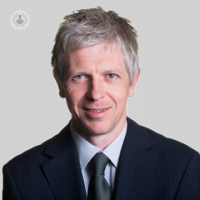How to prepare for an echocardiogram
Written by:An echocardiogram is a quick and painless test that can help diagnose various different heart conditions. In his latest online article, highly-knowledgeable cardiologist Dr Malcolm Burgess explains everything you need to know about preparing for an echocardiogram.

How do I prepare for an echocardiogram?
There is not much preparation needed for an echocardiogram. A useful tip is to wear loose-fitting clothing on the upper part of the body, as they will need to take off the top layer. This will usually be replaced with a gown before the start of the test.
Should I fast before an echocardiogram?
No, there is no requirement at all to fast or modify your diet before an echocardiogram.
What should I wear to an echocardiogram?
As mentioned above, it is a good idea to wear something loose-fitting on the upper half of your body. Jewellery that dangles across the chest is not ideal but can be removed for the duration of the echocardiogram.

Are there any medications or supplements I should stop taking before an echocardiogram?
No, patients can continue to take their medications as usual. There are some specialised forms of echocardiography, for example, a stress echocardiogram. This is when the heart is examined in a dynamic fashion, both at rest and while under stress. In this case, if the patient is taking medication to slow the heart such as beta blockers, they will usually have to stop taking this medication a couple of days prior to the test.
What should I bring with me to an echocardiogram appointment?
As we are measuring the size of the heart and the thickness of the walls and chambers, these need to be indexed to the patient’s size. Larger patients should have a larger heart, and smaller patients should have a smaller heart. If the patient has their height and weight readily available, that is very helpful, but other than this they don’t need to worry about bringing anything with them on the day of the echocardiogram.
Dr Malcolm Burgess is a highly-experienced consultant cardiologist with over 30 years of experience. If you would like to book an appointment with Dr Burgess you can do so today via his Top Doctors profile.


